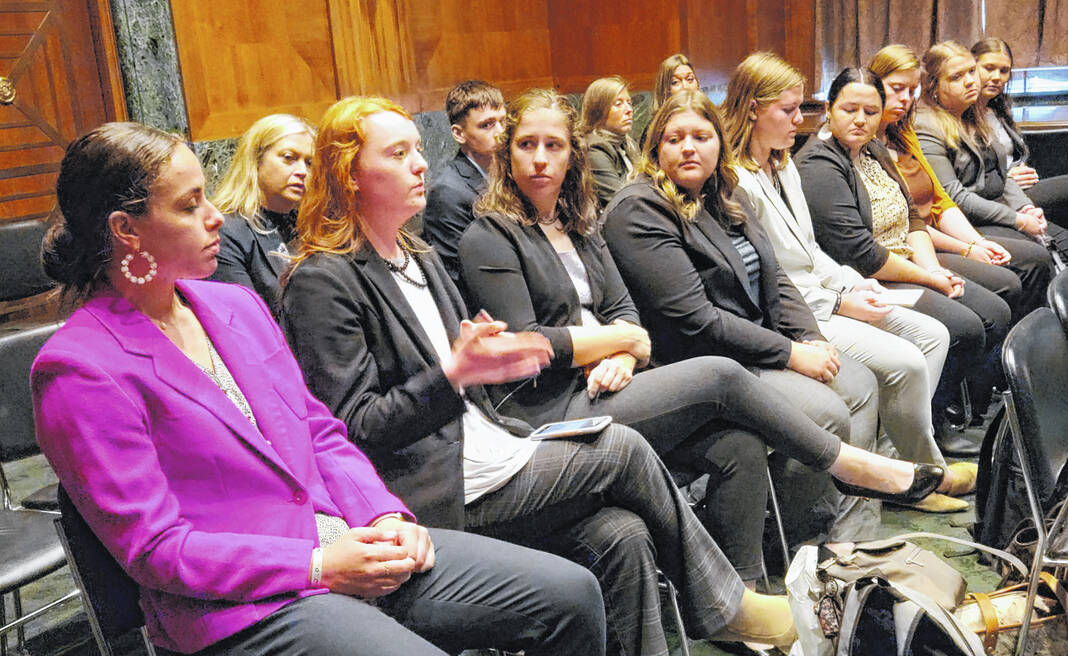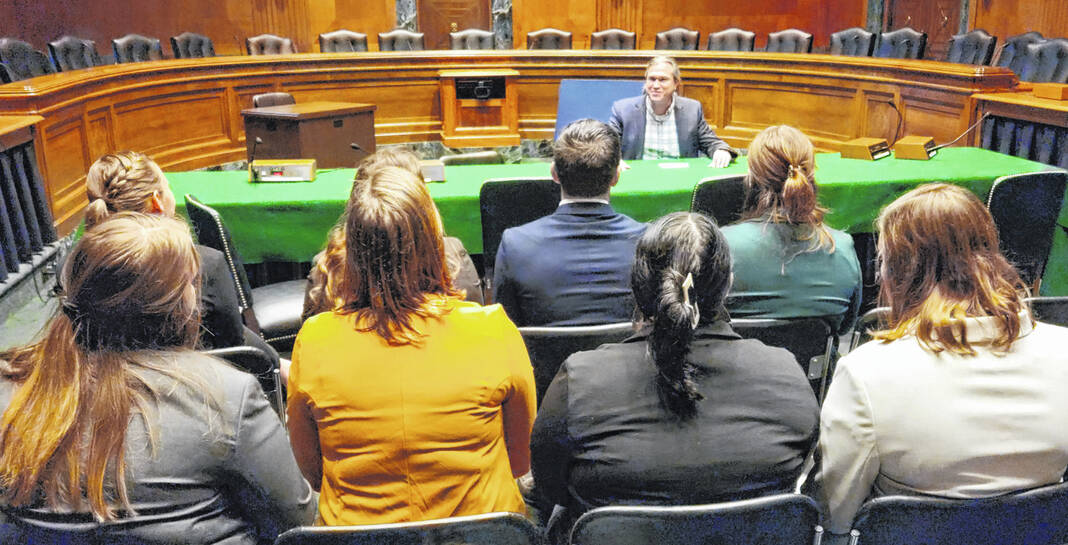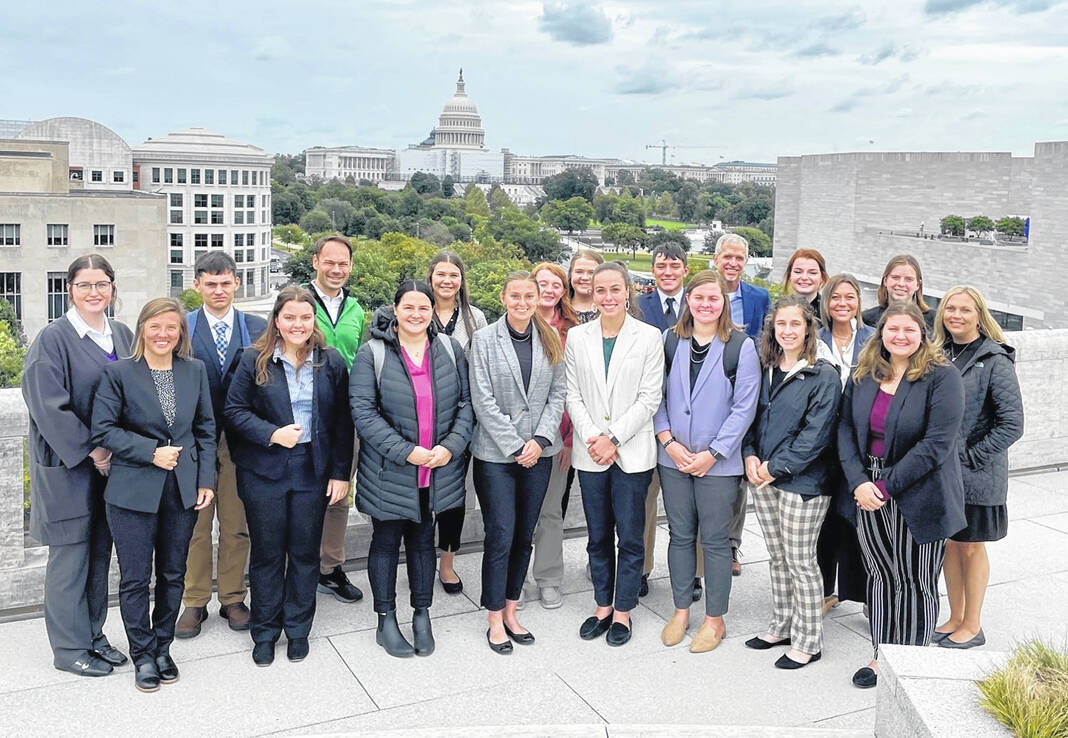


Nearly one-third of the food produced in the United States is wasted and the repercussions are enormous.
The losses amount to $936 billion a year and a quarter of the fresh water used by the agriculture industry, Ten percent of greenhouse gas emissions come from food rotting in landfills and its all food that never reaches of mouths of an ever-hungrier world, which recently surpassed 8 billion persons.
Agriculture students at Wilmington College recognize the severity and timeliness of the issue and went to Washington, D.C., earlier this month to lobby their elected officials to move the food waste issue closer to the top of their legislative agendas.
Learning to lobby is a signature, hands-on experience at Wilmington College and, each fall, agriculture students make the trip to the Nation’s Capital to learn by doing.
“This experience puts students’ knowledge and abilities to the test, which gives them confidence,” said trip co-director Dr. Michael Snarr, professor of political science and an organizer of the College’s annual Spring Lobby Trips since the mid-2000s.
In recent years, WC also has offered agriculture students a fall experience advocating on issues directly affecting the industry in which they are preparing for careers.
College officials call it “ag-vocacy.”
“I don’t know of other colleges that do this with specific majors like agriculture,” Snarr added. “It’s empowering for students to get off campus and do this sort of thing in the halls of Congress.”
Snarr summed up the value of citizens advocating on important issues by paraphrasing the now-retired agriculture professor, Dr. Monte Anderson, who co-led many of the ag lobby trips: “If you don’t speak up and try to influence decisions, someone else will make the policies for you.”
The WC contingent met with officials from the U.S Dept. of Agriculture (USDA), the Canadian Embassy, Friends Committee on National Legislation, U.S. Sen. Sherrod Brown’s office and the non-governmental organizations, Food Rescue USA and the Foundation for Food and Agricultural Research, in addition to their individual elected representatives or staff.
“The students asked good questions. They belonged there and knew their stuff,” Snarr said, noting the students’ impressive preparation was both recognized and appreciated by the officials.
Garrett Simmons and Riley Eberhart are two of the 15 students who flew to Washington for the lobby trip with Snarr and three others, co-director Dr. Corey Cockerill, assistant dean for the sciences and professor of communication arts and agriculture; Dr. Javonne Mullins, assistant professor of agriculture; and Jenny Tower, assistant director of admission and agricultural recruiter.
Simmons, a sophomore agronomy major from Frankfort, Ohio, noted that, of the 33 percent of food that is wasted, 14 percent of that waste occurs between the farm and the next step in the process whose end result is food being available through retail or commercial sales.
For various reasons, including transportation, mishandling, improper packaging, rejection of cosmetically imperfect produce and supply chain issues — often through no fault of the farmer — food is left unharvested in the fields and milk is dumped before ever leaving the farm.
“We need to step it up on our end as producers and lessen the impact,” Simmons said, noting he’s benefitted from the knowledge he’s gained on the food waste topic and believes his lobbying experience is yet another skill to add to his toolbox when he embarks upon a career in agronomy. “It’s an opportunity to make meaningful impact by talking to legislators — learning that, ‘Hey, I actually have a voice in this.’ The lobby trip is a great experience and can be a great door opener.”
Indeed, Simmons met WC alumnus Tony Staubach, food waste diversion coordinator for Warren County, on the trip. He’s exploring the possibility of doing an internship with Staubach’s office.”
Staubach shared startling statistics about food waste from the user end of the spectrum.
Some 38 million Americans experience food insecurity while more than 63 million tons of food are discarded each year. Only 7 percent of the food thrown away is recovered to feed hungry people and only 4 percent is composted. Fifty percent of all rejected food ends up in landfills, generating 10 percent of methane gas produced in America.
“All that food waste hurts the farmer,” Eberhart said. She noted about Staubach, “I’ve seen a lot of students go off and apply Wilmington College’s values in their careers. It’s great seeing what we’re learning and doing here will apply to our careers.”
The students learned the food waste issue is in-committee in the House of Representatives and likely could become the USDA’s responsibility as part of the 2023 Farm Bill.
For Snarr, the bottom line is, “We have to produce more food for a growing world population and one way to accomplish that is eliminating waste.”




